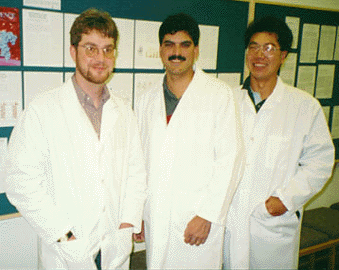![[Currents header graphic]](/homeart/currents_header.gif)
![[Currents header graphic]](/homeart/currents_header.gif)
February 23, 1998

|
|
Arun Kashyap (center) is pictured with former Affymax colleagues Nick Wrighton (left) and Ray Chang. The trio were among those honored with the Newcomb Cleveland Prize this year.
|
A UCSC graduate student has received the prestigious Newcomb Cleveland Prize from the American Association for the Advancement of Science (AAAS).
AAAS grants the Newcomb Cleveland Prize to the author or authors of the outstanding research paper published in the organization's journal, Science, during the previous year; two related papers were chosen this year.
Arun Kashyap, a UCSC biology student, shared the $5,000 prize and bronze medal with the other authors of the winning papers. AAAS presented its 1997-98 awards, including the Newcomb Cleveland Prize, at the organization's annual meeting in Philadelphia on February 16.
The papers chosen this year were "Small Peptides as Potent Mimetics of the Protein Hormone Erythropoietin," written by Kashyap and nine others; and "Functional Mimicry of a Protein Hormone by a Peptide Agonist: The EPO Receptor Complex at 2.8 Angstrom," authored by nine people.
Published July 26, 1996, the two papers were the product of a collaborative effort of three research groups: Affymax Research Institute in Palo Alto, Scripps Research Institute in La Jolla, and the Robert Wood Johnson Pharmaceutical Research Institute in Raritan, New Jersey. The paper Kashyap helped write was based on research carried out by Kashyap and others while he was employed at Affymax.
Kashyap said he feels "very fortunate to not only have worked with exceptional people resulting in this discovery, but to also have the work recognized by the AAAS."
In the research described by the papers, the authors developed small peptides that mimic the effects of erythropoietin (EPO), a large hormone that helps make red blood cells. The peptides are completely unrelated to the natural hormone. EPO is sometimes administered intravenously to chemotherapy patients and by injection to people who suffer from chronic kidney failure or who have low red blood cell counts. The research may lead to more conveniently administered treatments.